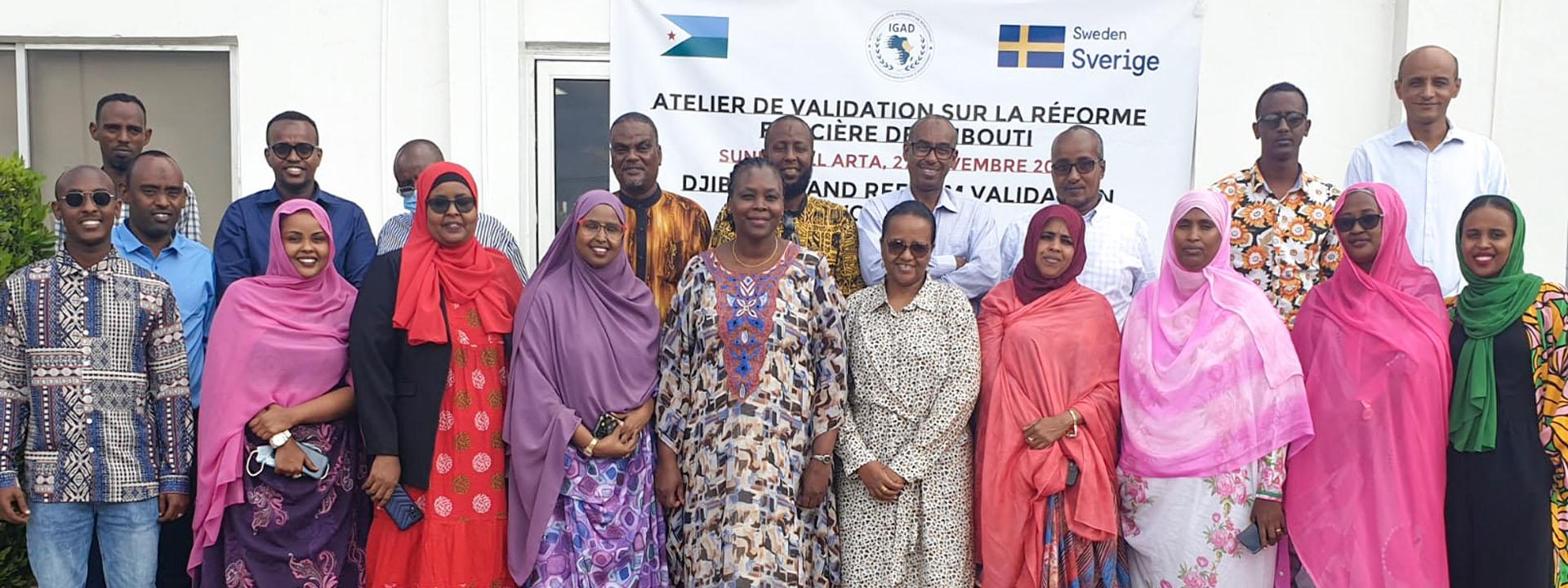November 27, 2022 (DJIBOUTI, Djibouti): The Intergovernmental Authority on Development (IGAD) through its IGAD Land Governance Programme with support from Swedish Embassy held a Validation meeting of the Djibouti Land Reform and Investment Plan 2022-2032.
The meeting brought together an array of experts from Government Departments at the National and decentralised institutions with an interest in land to validate the Draft Report Submitted by the consultant.
The institutions represented were Directorate of Domain and Land Conservation from Ministry of Budget, Ministry of the City, Urbanism and Housing, Ministry of Women and Family, Ministry of Budget, Prefecture of Djibouti, Djibouti City Hall, Ministry of Decentralisation, Arulos, Agency for Urban Renewal and Social Housing, Ministry of Agriculture, Ministry of Agriculture, Civil society, Tax department, and Parliament.
The meeting seeks to improve performance of the land administration function in the IGAD region and to enable implementation of cross border initiatives that have a bearing on land.
The Director General of Estates and Land Conservation of Djibouti, Mr. Houssein Mahamoud Barreh stated: “To cope with the constraints, the General Directorate of Lands and Land Conservation requires material means and adequate instruments that can facilitate and improve the operationality of the Lands Directorate to strengthen the land tenure security as well as to increase the number land transactions requested by external operators and users.
It is in this perspective that IGAD intends to strengthen the land administration of the Member States, the development of such a strategic framework document is part of a perspective of development and institutional strengthening for the administration in order to equip the actors in charge of land to rely on a reference document at the level of land management for the period 2022-2032.”
The Deputy General Director of Urban Rehabilitation and Social Housing Agency at the Ministry of the City, Urban Planning and Housing of the Republic of Djibouti, Mr. Mohamed ABDILLAHI ALI, said: “We are particularly honored to be associated with the ongoing land policy and land use planning reform. As representatives of the Djiboutian administration and future users of the final product, we can make our contribution to the reform. With the expected results in the end, there is no doubt that the use of land will be improved to bring more to the national economy as a whole, the resolution of land disputes will be easier and the gender dimension integrated.”
In her opening speech, Coordinator IGAD Land Governance Programme. Esther Obaikol said that: “The IGAD Region is at the wake of institutionalising land reforms that are anchored in the framework and guidelines on land policy in Africa, as well as responding through the AU Declaration on Land Issues and Challenges. We at IGAD are proud of the Government of Djibouti for taking the bold step to start its land reform through a consultative and participatory process.”
“Land Reforms take effort and coordination; they take ownership of the process and financial commitments. They are a long-term reiterative process that requires political will at the highest level of Government. This first step, in which Djibouti defines its strategy to shape the reforms is very significant not only for Djibouti, but for the other IGAD Member states, who will learn from this example as they embark on their land reform journeys. IGAD indeed plays its pivotal role as convenor and support to Member States own vision as we move the region toward convergence, using land as an enabler for social, economic, environmental, and political development goals”, she added.
The outcome of the validation meeting will lead to the finalisation of the Strategy document on the Djibouti Land Reform and Investment plan 2022 – 2023

